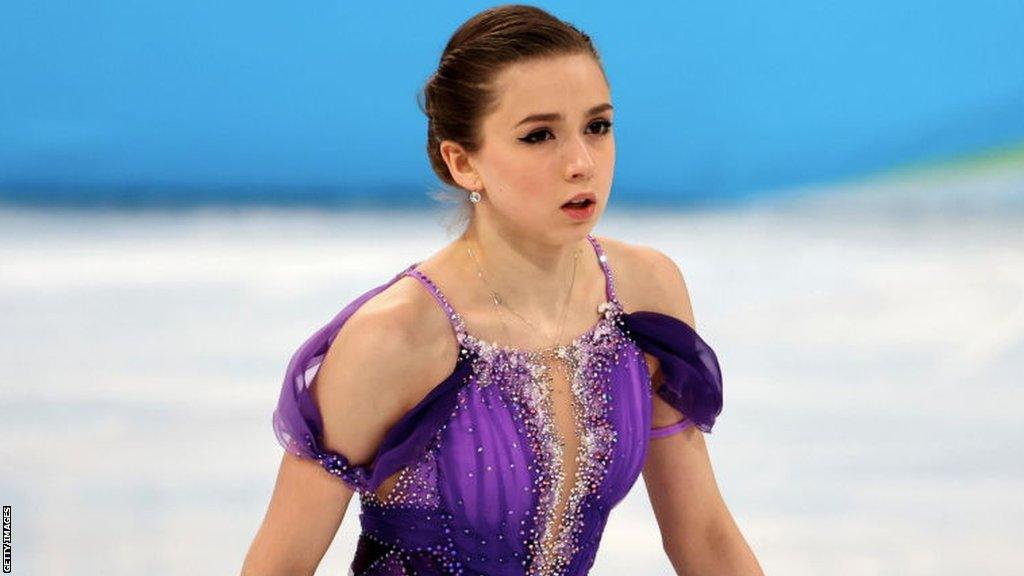Kamila Valieva claimed contaminated strawberry dessert behind positive test
- Published

News of Kamila Valieva's failed test only emerged after she helped Russia to Olympic gold
Banned Russian figure skater Kamila Valieva claimed her positive doping test could have been caused by a strawberry dessert prepared by her grandfather on the same chopping board he used to crush his pills.
Valieva was given a four-year ban after testing positive for banned heart medication trimetazidine in December 2021, when she was 15-years-old.
The Court of Arbitration for Sport (Cas) found Valieva's explanation "was not corroborated by any concrete evidence".
Valieva, now 17, emerged as a global star at the 2022 Winter Olympics in Beijing, becoming the first female skater to land a quadruple jump and winning team figure skating gold.
Her anti-doping rule violation (ADRV) was recorded in a sample collected from her during the Russian National Championships on 25 December 2021 - the start of her backdated ban.
In the full report published by Cas on Wednesday, Valieva asserted that the prohibited trimetazidine could have entered her body after the strawberry dessert prepared by her grandfather, Gennaidy Solovyov, was contaminated.
Another explanation forwarded by Valieva was that she might have shared a glass used by her grandfather to dissolve his medication, she had herself taken a contaminated supplement or medication, or that her food or drink was sabotaged.
"I saw a few times accidentally, that he crushed the pills with the knife and dissolves them in a glass, and took them. So I might have drunk from the same glass or there, at home, I might have eaten something from the same chopping board and so on," Valieva said in submitted evidence.
Cas found Valieva had "on the balance of probabilities" not been able to establish that she had not committed the ADRV intentionally.
It added there were "a number of evidential difficulties", including the lack of evidence relating to Solovyov's use of trimetazidine prior to 25 December 2021, and concluded there were "too many shortcomings in the evidence, and too many unanswered questions".
It ruled the athlete's level of fault was significant and there was no basis to treat her any differently from an adult.
A Russian Anti-Doping Agency (Rusada) investigation initially found the teenager bore "no fault or negligence" for the failed test, but the World Anti-Doping Agency (Wada) appealed against that ruling at Cas, sport's highest court.
Valieva's competitive results since the date of her failed test have been voided, including her contribution to the team gold medal she helped the Russian Olympic Committee (ROC) achieve.
The ROC said it would appeal against the decision of the International Skating Union (ISU) - the sport's governing body - to relegate the Russian team from gold to bronze after removing Valieva's scores.
The Kremlin has said it does not accept the Cas ruling, nor the decision to relegate Russia to bronze, and will defend the rights of Russian athletes.
Russians were only permitted to compete at the Beijing Games as neutral athletes competing for the ROC.
The nation was banned from all international sport for four years by Wada from 2019 following a state-sponsored doping scandal - however Cas reduced the ban, allowing Russian athletes to compete at international events but without using the Russian name, flag, or anthem.
While Wada welcomed the Cas decision to ban Valieva, it said those behind the failed tests should also face justice.
"The doping of children is unforgivable," it said. "Doctors, coaches or other support personnel who are found to have provided performance-enhancing substances to minors should face the full force of the World Anti-Doping Code.
"Indeed, Wada encourages governments to consider passing legislation - as some have done already - making the doping of minors a criminal offence."